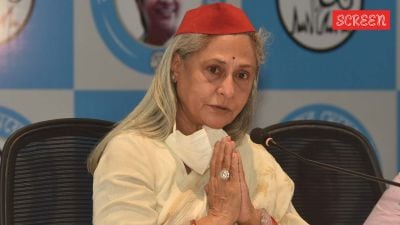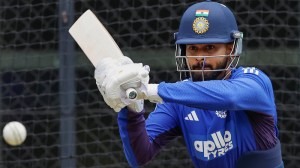Yeh dil mange more
The weather gods probably have a bone to pick with Chief Election Commissioner Manohar Singh Gill. For two weeks he has been blaming the ...

The weather gods probably have a bone to pick with Chief Election Commissioner Manohar Singh Gill. For two weeks he has been blaming the heat, the rains and the floods for not being able to arrive at a date for elections.
But if you know him well, you8217;d also know why he wasn8217;t ever going to hold elections this June and spoil an entire country8217;s 8212; and his own 8212; cricket World Cup season. Nothing, not even the mention of his predecessor, excites him more than the mention of the word cricket. So he wasn8217;t going to sit back counting the companies of paramilitary forces on election duty in Bihar and Assam while the greatest cricketing event of the millennium was on in England. It would have been too cruel a price to pay for our wayward politics. So instead we sit back, relax, take out our calculators and use them to figure out asking rates, strike rates and so on, instead of bothering about the arithmetic of coalitions and defections. We can even sing to the Pepsi jingle, Yeh dil mange more.
Theelections won8217;t take place until the end of September. The government says it will function like a real government, forget this caretaker business. Time then to forget politics, the heat wave, the rise and fall of the sensex and the prospect of yet another rickety coalition or an Italian prime minister. Time to think cricket instead. Time also to hope and pray that our cricketers bring forth the qualities we have ceased to expect from our political leaders: teamwork, loyalty, national spirit, honesty of purpose, professionalism and so on. When eleven Indians perform as a team, and win, all else is forgotten. Remember the magic moments at Lord8217;s, 1983? Or Sydney at the 1985 World Championship?
But there would be nothing more unfair, nothing more belittling to this uniquely subcontinental state of mind than treating the World Cup as just a pleasant distraction from politics. In these parts, it means a lot more. Here, we treat our cricketers as gods. Cricket is not just a game. It is a phenomenon that unitesus in victory, shatters us in defeat, symbolises national spirit and self-esteem and fires our imagination as nothing else does. No Pokharan, no Agni and certainly no three-digit surge in the sensex.
Cricket is now serious business. So serious, it is the new flavour of the fortnight even for sociologists and political scientists. Doctorates are being written on why cricket is such a popular sport in former British colonies, how it divides 8212; and unites 8212; societies. What a World Cup victory did for a tiny, war-torn nation such as Sri Lanka, how cricket is the only factor that unites 8212; well, not always 8212; the distant island states of the Caribbean, and so on. Behaviourialists had, to be fair, discovered the game much earlier. A friend of mine in Pakistan 8212; she is sometimes called the Sudhir Kakar of her country 8212; has even written a paper on how cricket is so deeply rooted in the subcontinent8217;s sexual machismo in terms of its idiom, imagery and attitude: you are fine as long as the stumps are up, out whenthey are out; you field at slips and gully and fine leg and mid-on and so on, you bowl a maiden over, you are as good as your strokes and so on. A bit of an overkill, perhaps, but when did cricket, since the days of Neville Cardus, ever make for understatement?
What is more important, however, is the way business has discovered cricket, and vice versa. All the issues over which elections are sometimes fought and won, which parliaments debate endlessly and over which we editorialists expend so much adrenalin, seem to have already been settled by the business of cricket. Our diplomats and politicians still haggle endlessly on a South Asian free trade zone. Our cricket organisers have already created a common market with cricket the first 8220;commodity8221; to be freely traded. India, Pakistan, Sri Lanka 8212; now even Bangladesh 8212; and with their combined diaspora in the Gulf and elsewhere now constitute the bulk of the market cricket caters to. So it pays Wills, or Pepsi, or Eveready, to sponsor cricket and reachout instantly to such a huge market. The same satellite channels beam the matches to all the countries of the region and strike deals for their cricket boards as well as national broadcasters. No surprise then that the representative of a satellite sports channel may find himself more welcome in another country of the region than even his foreign secretary. If you have doubts, ask the CEO of ESPN. Does anyone care in Pakistan or Sri Lanka where his company is based or what passport he happens to carry?
Welcome now to cricket8217;s new world without borders. You and I or the Swadeshi Jagran Manch may still worry about how the MNCs will subvert our system. But please look at the sports pages, and elsewhere in our papers and on TV channels, and see how all kinds of MNCs are cheering the Indian team. So what if a bulk of them happen to be Korean or Japanese with about as much understanding of cricket as I have of sepak takraw. They have merchandise to sell in the subcontinent and who would they rope in but the onlypeople we would still trust, despite all their failings, defeats, non-performance and betting scandals, our cricketers. Funny, if people believe a Sachin Tendulkar can persuade a Pakistani to buy a particular brand of soft drink or shampoo.
Which brings me to a delightful story I8217;ve been saving up since February 1992, when the World Cup was on in Australia and New Zealand. Manmohan Singh, in the first flush of his reformist phase, decided to liberalise gold imports. It was obviously a step meant to destroy the gold smuggling business. Who else would this hurt more than Dawood Ibrahim, I thought, and called him in Dubai. Sure enough, just as I had expected, the don was distraught, even heart-broken.
quot;What will happen to your business now?quot; I asked with a mischievous emphasis on quot;businessquot;.
quot;Shekharbhai, business is no problem. Actually if Dr Singh had asked me, I would had given him a much better plan to stop the smuggling, not just of gold but everything. I am actually upset about somethingelse.quot;
quot;Now, what could be worse than this?quot; I asked.
quot;You know, this wretched Indian cricket team. They lost to the West Indies this morning. And I had put so much money on them.quot;
quot;But you should be smart enough to know which team you should back,quot; I said.
quot;It is not like that, Shekharbhai. When India plays cricket how can I bet on someone else winning?quot;
That8217;s cricket for you sociologists, political scientists and shrinks. A man who is wanted on almost every conceivable charge of undermining the state in India would only bet for India when it comes to cricket. That is why it doesn8217;t matter if our cricketers are such losers, if the selectors are such clowns, if Azhar can no longer score more than five, if they are all into betting and match-fixing. It doesn8217;t even matter whether this is a caretaker government or not, whether it can promulgate FEMA and save me from the wrath of FERA. I am still betting on India. All of 50 pounds, FERA, the odds, the match-fixing scandals, the politics and theelections, be damned.
- 01
- 02
- 03
- 04
- 05































